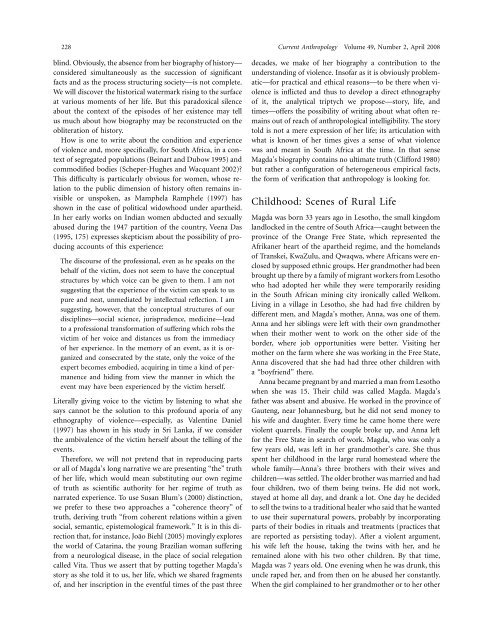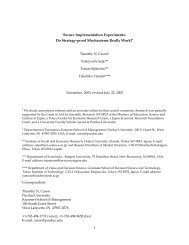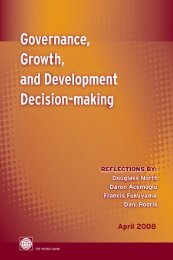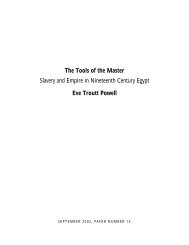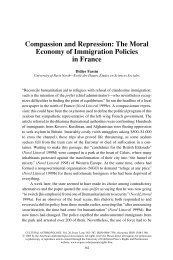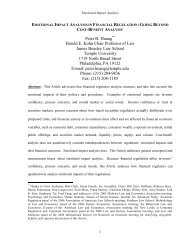Life & Times of Magda A: Telling a Story of Violence in South Africa
Life & Times of Magda A: Telling a Story of Violence in South Africa
Life & Times of Magda A: Telling a Story of Violence in South Africa
Create successful ePaper yourself
Turn your PDF publications into a flip-book with our unique Google optimized e-Paper software.
228 Current Anthropology Volume 49, Number 2, April 2008<br />
bl<strong>in</strong>d. Obviously, the absence from her biography <strong>of</strong> history—<br />
considered simultaneously as the succession <strong>of</strong> significant<br />
facts and as the process structur<strong>in</strong>g society—is not complete.<br />
We will discover the historical watermark ris<strong>in</strong>g to the surface<br />
at various moments <strong>of</strong> her life. But this paradoxical silence<br />
about the context <strong>of</strong> the episodes <strong>of</strong> her existence may tell<br />
us much about how biography may be reconstructed on the<br />
obliteration <strong>of</strong> history.<br />
How is one to write about the condition and experience<br />
<strong>of</strong> violence and, more specifically, for <strong>South</strong> <strong>Africa</strong>, <strong>in</strong> a context<br />
<strong>of</strong> segregated populations (Be<strong>in</strong>art and Dubow 1995) and<br />
commodified bodies (Scheper-Hughes and Wacquant 2002)?<br />
This difficulty is particularly obvious for women, whose relation<br />
to the public dimension <strong>of</strong> history <strong>of</strong>ten rema<strong>in</strong>s <strong>in</strong>visible<br />
or unspoken, as Mamphela Ramphele (1997) has<br />
shown <strong>in</strong> the case <strong>of</strong> political widowhood under apartheid.<br />
In her early works on Indian women abducted and sexually<br />
abused dur<strong>in</strong>g the 1947 partition <strong>of</strong> the country, Veena Das<br />
(1995, 175) expresses skepticism about the possibility <strong>of</strong> produc<strong>in</strong>g<br />
accounts <strong>of</strong> this experience:<br />
The discourse <strong>of</strong> the pr<strong>of</strong>essional, even as he speaks on the<br />
behalf <strong>of</strong> the victim, does not seem to have the conceptual<br />
structures by which voice can be given to them. I am not<br />
suggest<strong>in</strong>g that the experience <strong>of</strong> the victim can speak to us<br />
pure and neat, unmediated by <strong>in</strong>tellectual reflection. I am<br />
suggest<strong>in</strong>g, however, that the conceptual structures <strong>of</strong> our<br />
discipl<strong>in</strong>es—social science, jurisprudence, medic<strong>in</strong>e—lead<br />
to a pr<strong>of</strong>essional transformation <strong>of</strong> suffer<strong>in</strong>g which robs the<br />
victim <strong>of</strong> her voice and distances us from the immediacy<br />
<strong>of</strong> her experience. In the memory <strong>of</strong> an event, as it is organized<br />
and consecrated by the state, only the voice <strong>of</strong> the<br />
expert becomes embodied, acquir<strong>in</strong>g <strong>in</strong> time a k<strong>in</strong>d <strong>of</strong> permanence<br />
and hid<strong>in</strong>g from view the manner <strong>in</strong> which the<br />
event may have been experienced by the victim herself.<br />
Literally giv<strong>in</strong>g voice to the victim by listen<strong>in</strong>g to what she<br />
says cannot be the solution to this pr<strong>of</strong>ound aporia <strong>of</strong> any<br />
ethnography <strong>of</strong> violence—especially, as Valent<strong>in</strong>e Daniel<br />
(1997) has shown <strong>in</strong> his study <strong>in</strong> Sri Lanka, if we consider<br />
the ambivalence <strong>of</strong> the victim herself about the tell<strong>in</strong>g <strong>of</strong> the<br />
events.<br />
Therefore, we will not pretend that <strong>in</strong> reproduc<strong>in</strong>g parts<br />
or all <strong>of</strong> <strong>Magda</strong>’s long narrative we are present<strong>in</strong>g “the” truth<br />
<strong>of</strong> her life, which would mean substitut<strong>in</strong>g our own regime<br />
<strong>of</strong> truth as scientific authority for her regime <strong>of</strong> truth as<br />
narrated experience. To use Susan Blum’s (2000) dist<strong>in</strong>ction,<br />
we prefer to these two approaches a “coherence theory” <strong>of</strong><br />
truth, deriv<strong>in</strong>g truth “from coherent relations with<strong>in</strong> a given<br />
social, semantic, epistemological framework.” It is <strong>in</strong> this direction<br />
that, for <strong>in</strong>stance, João Biehl (2005) mov<strong>in</strong>gly explores<br />
the world <strong>of</strong> Catar<strong>in</strong>a, the young Brazilian woman suffer<strong>in</strong>g<br />
from a neurological disease, <strong>in</strong> the place <strong>of</strong> social relegation<br />
called Vita. Thus we assert that by putt<strong>in</strong>g together <strong>Magda</strong>’s<br />
story as she told it to us, her life, which we shared fragments<br />
<strong>of</strong>, and her <strong>in</strong>scription <strong>in</strong> the eventful times <strong>of</strong> the past three<br />
decades, we make <strong>of</strong> her biography a contribution to the<br />
understand<strong>in</strong>g <strong>of</strong> violence. Ins<strong>of</strong>ar as it is obviously problematic—for<br />
practical and ethical reasons—to be there when violence<br />
is <strong>in</strong>flicted and thus to develop a direct ethnography<br />
<strong>of</strong> it, the analytical triptych we propose—story, life, and<br />
times—<strong>of</strong>fers the possibility <strong>of</strong> writ<strong>in</strong>g about what <strong>of</strong>ten rema<strong>in</strong>s<br />
out <strong>of</strong> reach <strong>of</strong> anthropological <strong>in</strong>telligibility. The story<br />
told is not a mere expression <strong>of</strong> her life; its articulation with<br />
what is known <strong>of</strong> her times gives a sense <strong>of</strong> what violence<br />
was and meant <strong>in</strong> <strong>South</strong> <strong>Africa</strong> at the time. In that sense<br />
<strong>Magda</strong>’s biography conta<strong>in</strong>s no ultimate truth (Clifford 1980)<br />
but rather a configuration <strong>of</strong> heterogeneous empirical facts,<br />
the form <strong>of</strong> verification that anthropology is look<strong>in</strong>g for.<br />
Childhood: Scenes <strong>of</strong> Rural <strong>Life</strong><br />
<strong>Magda</strong> was born 33 years ago <strong>in</strong> Lesotho, the small k<strong>in</strong>gdom<br />
landlocked <strong>in</strong> the centre <strong>of</strong> <strong>South</strong> <strong>Africa</strong>—caught between the<br />
prov<strong>in</strong>ce <strong>of</strong> the Orange Free State, which represented the<br />
Afrikaner heart <strong>of</strong> the apartheid regime, and the homelands<br />
<strong>of</strong> Transkei, KwaZulu, and Qwaqwa, where <strong>Africa</strong>ns were enclosed<br />
by supposed ethnic groups. Her grandmother had been<br />
brought up there by a family <strong>of</strong> migrant workers from Lesotho<br />
who had adopted her while they were temporarily resid<strong>in</strong>g<br />
<strong>in</strong> the <strong>South</strong> <strong>Africa</strong>n m<strong>in</strong><strong>in</strong>g city ironically called Welkom.<br />
Liv<strong>in</strong>g <strong>in</strong> a village <strong>in</strong> Lesotho, she had had five children by<br />
different men, and <strong>Magda</strong>’s mother, Anna, was one <strong>of</strong> them.<br />
Anna and her sibl<strong>in</strong>gs were left with their own grandmother<br />
when their mother went to work on the other side <strong>of</strong> the<br />
border, where job opportunities were better. Visit<strong>in</strong>g her<br />
mother on the farm where she was work<strong>in</strong>g <strong>in</strong> the Free State,<br />
Anna discovered that she had had three other children with<br />
a “boyfriend” there.<br />
Anna became pregnant by and married a man from Lesotho<br />
when she was 15. Their child was called <strong>Magda</strong>. <strong>Magda</strong>’s<br />
father was absent and abusive. He worked <strong>in</strong> the prov<strong>in</strong>ce <strong>of</strong><br />
Gauteng, near Johannesburg, but he did not send money to<br />
his wife and daughter. Every time he came home there were<br />
violent quarrels. F<strong>in</strong>ally the couple broke up, and Anna left<br />
for the Free State <strong>in</strong> search <strong>of</strong> work. <strong>Magda</strong>, who was only a<br />
few years old, was left <strong>in</strong> her grandmother’s care. She thus<br />
spent her childhood <strong>in</strong> the large rural homestead where the<br />
whole family—Anna’s three brothers with their wives and<br />
children—was settled. The older brother was married and had<br />
four children, two <strong>of</strong> them be<strong>in</strong>g tw<strong>in</strong>s. He did not work,<br />
stayed at home all day, and drank a lot. One day he decided<br />
to sell the tw<strong>in</strong>s to a traditional healer who said that he wanted<br />
to use their supernatural powers, probably by <strong>in</strong>corporat<strong>in</strong>g<br />
parts <strong>of</strong> their bodies <strong>in</strong> rituals and treatments (practices that<br />
are reported as persist<strong>in</strong>g today). After a violent argument,<br />
his wife left the house, tak<strong>in</strong>g the tw<strong>in</strong>s with her, and he<br />
rema<strong>in</strong>ed alone with his two other children. By that time,<br />
<strong>Magda</strong> was 7 years old. One even<strong>in</strong>g when he was drunk, this<br />
uncle raped her, and from then on he abused her constantly.<br />
When the girl compla<strong>in</strong>ed to her grandmother or to her other


